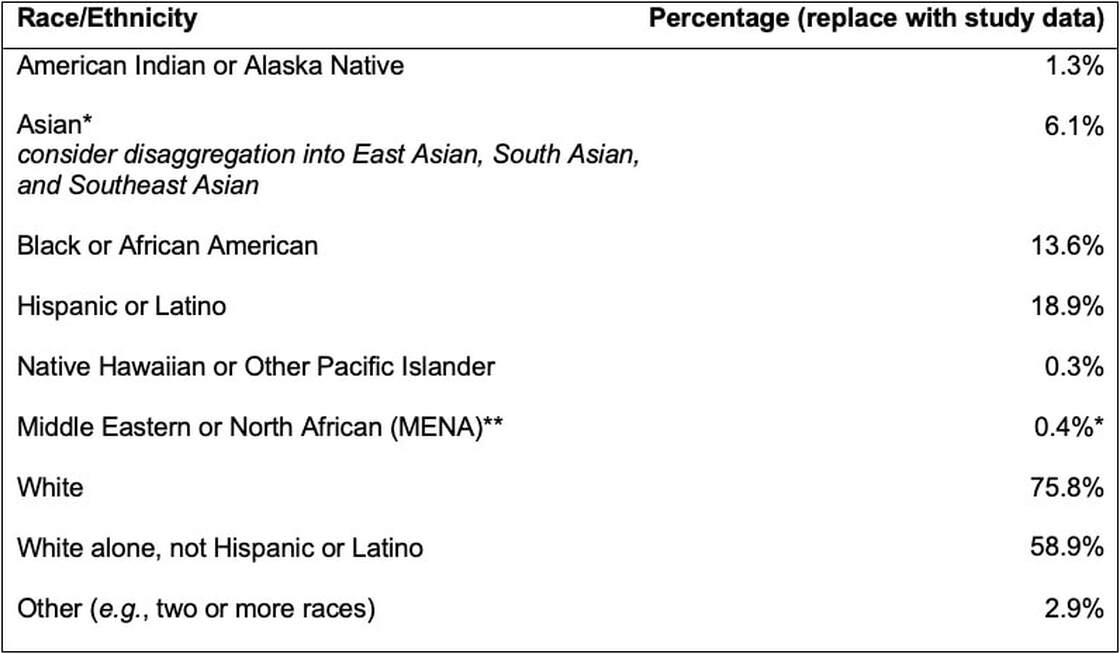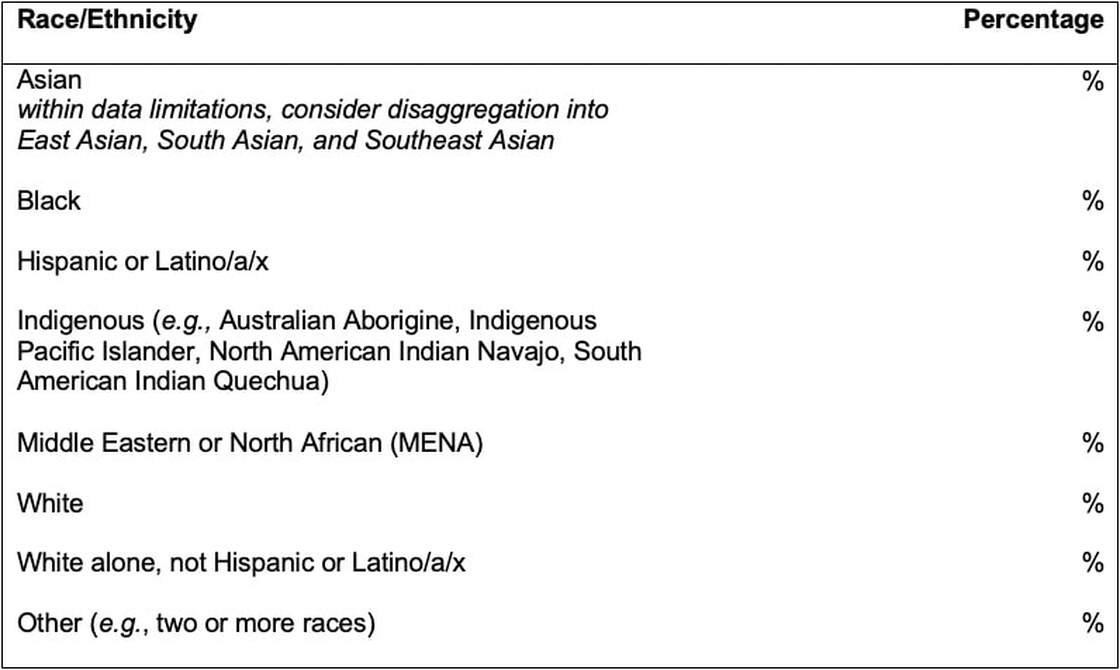Achieving health equity in medicine may seem daunting and even impossible. However, by the year 2060, greater than 55% of the US population will be represented by populations historically excluded in medical research. Let's take the first step towards 'color-conscious' research together by pledging to report the demographic breakdown of research cohorts by race/ethnicity in our future research studies. Even if there is ultimately zero inclusion of underrepresented populations in your research study, data transparency plays a critical role in illuminating this pervasive barrier to equitable representation in medical research. Don't forget to check out the RISE standardized breakdown labels below!
I wish to advance equitable representation in evidence-based healthcare and thereby pledge:
- To discover my own implicit biases and practice cultural humility"The term "cultural humility" was introduced in 1998 as a dynamic and lifelong process focusing on self-reflection and personal critique, acknowledging one’s own biases. It recognizes the shifting nature of intersecting identities and encourages ongoing curiosity rather than an endpoint."
-Shamaila Khan, PhD - To recognize that systemic inequities can lead to biased results and to minimize their impact through my own research efforts and peer-reviewed work
- To promote inclusion of underrepresented populations and report the demographic breakdown of research cohorts by race/ethnicity At this time, RISE does NOT endorse sub-analyses by race/ethnicity unless your research team is specifically conducting health disparities research. If your research team is conducting health disparities research, please keep in mind that while the perceived health implications of ethnicity are ever-changing, race is a social construct. Therefore, it is important to consider the role of racism and systemic inequities, rather than race, in the discussion of observed health disparities or lack of representative samples. Check out our Equitable Medical Research Guide for more information.in my research studies when reasonably achievable* and appropriate*
- To support my fellow researchers in their pursuit of equitable and inclusive research data
*self-defined
Not sure how to report? Here are examples!
Table 1. RISE standardized race/ethnicity breakdown labels for application in the US (data reflects the US population reported by census.gov**)
Table 1. RISE standardized race/ethnicity breakdown labels for application in the US (data reflects the US population reported by census.gov**)
*Aggregated reporting of the Asian racial category ultimately undermines all populations represented by this category, with Southeast Asians suffering the most underrecognized disparities. Within the limitation of data availability, disaggregation of this category into East Asian, South Asian, and Southeast Asian should be considered.
**The projected MENA population is not currently recognized by the US government as an ethnic category, but they are instead instructed by the government to identify as White. This projected percentage has been subtracted from the White alone percentage that is listed on census.gov.
**The projected MENA population is not currently recognized by the US government as an ethnic category, but they are instead instructed by the government to identify as White. This projected percentage has been subtracted from the White alone percentage that is listed on census.gov.
Table 2. RISE standardized race/ethnicity breakdown labels for global application
*Aggregated reporting of the Asian racial category ultimately undermines all populations represented by this category, with Southeast Asians suffering the most underrecognized disparities. Within the limitation of data availability, disaggregation of this category into East Asian, South Asian, and Southeast Asian should be considered.
🚨👉 At this time, RISE does NOT endorse sub-analyses by race/ethnicity unless your research team is specifically conducting health disparities research. If your research team is conducting health disparities research, please keep in mind that while the perceived health implications of ethnicity are ever-changing, race is a social construct. Therefore, it is important to consider the role of racism and systemic inequities, rather than race, in the discussion of observed health disparities or lack of representative samples. Check out our Equitable Medical Research Guide for more information or contact us with any questions.
Home Pledge Contact Us
Copyright © 2022 All Rights Reserved by RISE | Photography (CC0): Wow Tech USA


